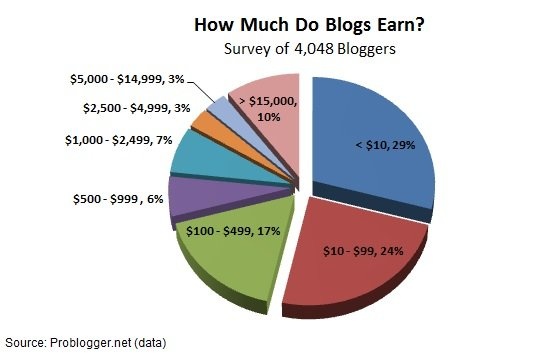Do blogs still make money? - Blogs are booming as gateways to digital income!
In the age of social media and lightning-fast content, you might wonder: do blogs still make money? The answer is a surprising yes! While the landscape has changed, blogs can be powerful tools for generating income. Let’s explore how creative and dedicated bloggers are turning their online presence into profit.
What are The Blogs?
Blogs are informational websites that are updated regularly with new content. They are typically written in a conversational style by an individual or a small group of people and cover a specific topic or niche. Here are some key features of blogs:
-
Regularly Updated: New blog posts are frequently added, with the most recent appearing first. This keeps readers engaged and coming back for more.
-
Informative: Blogs provide valuable information, insights, and perspectives on a particular subject.
-
Conversational Style: Unlike formal websites, blogs often use a friendly and informal writing style, making them more relatable to readers.
-
Interactive: Many blogs allow readers to leave comments and engage in discussions, fostering a sense of community.
Think of blogs as online journals or magazines focused on specific topics. They can be a great way to learn something new, stay up-to-date on current events, or simply be entertained by someone’s unique perspective.
Reasons want to start a blog?
-
Share Your Passion
-
Establish Yourself as an Expert
-
Build a Community
-
Make Money
-
Improve Your Writing Skills
-
Document Your Journey
-
Boost Your Creativity
-
Learn New Things
-
Leave Your Mark

10 Steps to start a blog
-
Choose Your Niche: Identify a specific topic or area of interest you’re passionate about and knowledgeable about. This will guide your content creation and attract a targeted audience.
-
Pick a Catchy Blog Name: Your blog name should be memorable, reflect your niche, and be easy to spell and pronounce. Ideally, it should also be available as a domain name (your website address).
-
Select a Blogging Platform: Popular options include WordPress.org (self-hosted, offering more flexibility), Blogger (free, easy to use, but less customizable), and Wix (user-friendly website builder with built-in blogging features).
-
Secure Your Domain Name and Hosting: If you choose a self-hosted platform like WordPress.org, you’ll need to register a domain name and obtain hosting services. There are many domain registrars and web hosting providers available.
-
Design Your Blog: Most platforms offer customizable templates to create a visually appealing, user-friendly blog layout that aligns with your brand or style.
-
Start Creating Content: Write engaging and informative blog posts that cater to your target audience. Focus on providing valuable insights, solutions, or entertainment related to your niche.
-
Optimize for Search Engines: Use relevant keywords and meta descriptions to improve your blog’s ranking in search engine results, making it easier for potential readers to find you.
-
Promote Your Blog: Spread the word about your blog on social media, online communities, and relevant forums. Guest blogging on other established websites can also drive traffic to your blog.
9. Engage with Your Audience: Respond to comments, answer questions, and participate in discussions to build a loyal readership and foster community.
- Analyze and Adapt: Track your blog’s performance using analytics tools to see what content resonates with your audience and make adjustments to your strategy as needed.

How do blogs are useful for making money?
- Display Ads:
-
Partner with ad networks like Google AdSense to display targeted ads on your blog.
-
You earn money each time someone clicks on an ad.
-
The more traffic your blog attracts, the more you can potentially earn.
- Affiliate Marketing:
-
Promote other companies’ products or services relevant to your niche.
-
Include affiliate links within your blog posts or reviews.
-
When a reader clicks the link and makes a purchase, you earn a commission.
- Sell Your Products:
-
Leverage your blog as a platform to sell your own digital or physical products.
-
This could be anything from ebooks and online courses to design templates or merchandise.
- Offer Paid Subscriptions:
-
Provide exclusive content or benefits to paying subscribers through platforms like Patreon or Substack.
-
This could be early access to new content, in-depth tutorials, personalized consultations, or access to a private community.
- Land Sponsored Content Deals:
-
Collaborate with brands to create sponsored content that promotes their products or services.
-
This could be a blog post review, a video showcasing a product, or even a social media shoutout.
-
Be transparent with your audience and disclose sponsored content.
- Become a Consultant or Coach:
-
Build credibility through your blog and establish yourself as an expert in your field.
-
This can lead to consulting opportunities, coaching sessions, or even workshops where you share your knowledge and expertise for a fee.

Here are some additional tips for maximizing your blog’s income potential:
-
Focus on building a large and engaged audience: The more readers you have, the more attractive your blog becomes to advertisers and potential partners.
-
Create high-quality, valuable content: Content is king! Consistently publish informative, engaging, and well-written blog posts that provide value to your readers and keep them coming back for more.
-
Optimize your blog for search engines: Improve your blog’s ranking in search results so that more people can discover your content organically.
-
Promote your blog on social media: Share your blog posts on social media platforms to drive traffic and attract new readers.
-
Network with other bloggers: Collaborate with other bloggers in your niche for guest blogging opportunities or joint promotions, expanding your reach to new audiences.
-
Track your results and analyze your data: Use website analytics tools to understand your audience demographics, what content resonates most, and identify areas for improvement.

Credit Card Rewards: Are They Worth It?
Credit Card Rewards: Are They Worth It?

10 Proven Strategies: How to Start a Business and Make Money?
10 Proven Strategies: How to Start a Business and Make Money?

Can you make money selling ebooks on Amazon? - The Power is in Your Hands
Can you make money selling ebooks on Amazon? - The Power is in Your Hands
